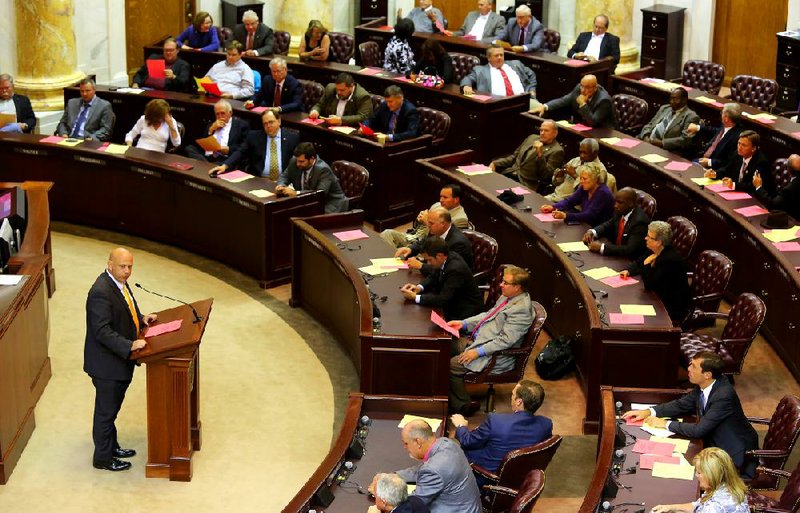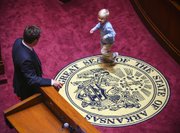The state Legislature approved legislation early today that authorizes the use of $43 million in state surplus funds to subsidize health insurance in 2014 for public-school employees.
RELATED ARTICLE
http://www.arkansas…">Bid to take 25-mill spillover fails
The short-term fix will help prevent 50 percent premium increases for thousands of the state’s teachers and other school workers.
House Bill 1003 needed at least three-quarters of the votes in both chambers to pass. The Senate passed it 34-0 a few minutes after midnight Friday. The House passed the same bill earlier Friday.
The measure now goes to Gov. Mike Beebe, who has promised to sign it.
Bills aiming to shift $36 million per year in state funds to the insurance program beginning in 2015 also flew through the Legislature. The Senate adjourned at 12:07 a.m., and the House, after voting on portions of the legislative package, wrapped up two minutes later.
The only lawmaker to cast any “no” votes this morning was Rep. Denny Altes, R-Fort Smith.
The early morning session followed a busy day Friday.
The House passed its version of the bills and sent them to the Senate.
Meanwhile, the Senate approved its own legislation and forwarded it to the House.
The legislation from the two chambers was identical, except for the bill numbers and names of sponsors.
The House and Senate also passed legislation creating a legislative task force to study the state insurance plans for public-school employees and state employees. Legislators also approved measures to oust the seven members of the board who oversee the plans.
Legislative leaders said late Friday that they had expected the House and Senate to quickly - and with little or no debate - pass the final legislation shortly after midnight.
Lawmakers “are ready to go home,” Senate President Pro Tempore Michael Lamoureux, R-Russellville, said Friday afternoon. But Arkansas law required that the legislators stay in session until today in order to approve the bills.
Article 5, Section 22 of the Arkansas Constitution bars the House and Senate from approving the same bill on the same day, said Senate chief counsel Steve Cook. So, lawmakers decided to stay into the wee hours of today to finish their work.
Early this week, Beebe, a Democrat, summoned lawmakers back to the Capitol for a special session. It convened Thursday afternoon to consider bills aimed at fixing the state’s financially strapped public-school employees health-insurance plan. If it had not convened, insurance premiums for those employees would have soared by about 50 percent.
“The good news is our teachers aren’t going to be hit with a catastrophic rate increase,” Beebe said. “They are going to get a 10 percent rather than a 50 percent rate increase on their health insurance. … They deserve all the help we can give them.”
Under measures approved Friday by the State and Public School Life and Health Insurance Board, the premiums for the most-expensive and popular insurance plan for individual school employees will increase to a maximum of $249.38 a month in 2014, up from $226.70 this year.
The monthly employee premiums for family coverage for the most-expensive and popular plan will increase from $1,029.96 to $1,132.96.
The health-insurance plan covers 47,000 teachers, cafeteria workers, janitors and other school employees and their families.
Bob Alexander, director of the state’s Employee Benefits Division, has cited a lack of funding from the state and school districts as the main reason for the insurance premiums increase.
The school employees are projected to pay $131 million in premiums this year.School districts are forecast to contribute $96 million and the state is expected to chip in $58 million, he said. The plan’s expenses are projected to total $312 million this year, with reserves covering any shortfall.
Earlier this year, the Legislature sent $8 million from the General Improvement Fund to help shore up the health-insurance plan and increased the school districts’ minimum contribution toward their employees’ premiums from $131 to $150 starting in January.
This week’s votes were lopsided.
In a 33-2 vote Friday with no debate, the Senate approved Senate Bill 2 by the Joint Budget Committee which also would have transferred $43 million of the state’s surplus funds to the insurance plan.
Sens. Alan Clark, R-Lonsdale, and Gary Stubblefield, R-Branch, cast the two votes opposing the measure.
“There is a whole lot more people out there than just teachers who are hurting,” Stubblefield said afterward. “We can’t bail out everybody. It’s that simple.”
Sen. Jason Rapert, R-Bigelow, said the insurance plan is managed by the State and Public School Life and Health Insurance Board. But taxpayers pay for the salaries and benefits for the employees.
“We need to be good stewards and do what we can,” he said, adding that a legislative task force will recommend changes in the health insurance plans by June in advance of the 2015 session.
“If we do not try to reform the system and also to control the premium spikes, people will continue to flee that plan, and we will have an even worse problem in the future,” said Rapert, who last month suggested that the Legislature convene in a special session to address the health-insurance problem.
In an 87-6 vote with no debate, the House approved a bill identical to the Senate’s version - House Bill 1003 sponsored by the Joint Budget Committee. Republican Altes, Jon Eubanks of Paris, Joe Farrer of Austin, Allen Kerr of Little Rock, Josh Miller of Heber Springs and John Payton of Wilburn case the votes in opposition.
It won’t be hard to find the $43 million to solve the insurance plan problems.
The state’s unobligated surplus funds total about $169 million, said state budget administrator Brandon Sharp.
The governor had sought more than a one-time bailout for the plan. The Legislature consequently passed longer-term changes, as well.
The Senate and House each approved two bills to clear the way for reallocating state funds from other educational programs to the public-school employees health-insurance plan in the future.
In a 33-1 vote, the Senate supported SB4 by Rapert that would allow savings from general facilities funding and supplemental millage incentive funding to be used for the insurance plan. It would shift about $16.3 million to the plan starting in fiscal 2015, according to the Department of Education.
In a 89-3 vote, the House approved an identical bill, HB1012 by Rep. Ann Clemmer, R-Benton.
In a 32-2 vote, the Senate approved SB5 by Sen. Jonathan Dismang, R-Searcy, that would cut professional-development funding for school districts from $54 per student to $32.40 per student, starting in the 2014-15 school year. Dismang said the legislation is expected to save the state about $10 million a year. He said the state Board of Education also is expected to reduce the number of hours required for teacher professional development from 60 hours to 36 hours.
In a 91-1 vote, the House approved an identical bill, HB1009 by Rep. James McLean, D-Batesville.
Dismang said the Legislature will eventually have to pass appropriation bills to shift the money from the facilities and professional development funds to the health insurance plan.
Also, legislative leaders have said they intend to use $10 million in general revenue, starting in fiscal 2015, to further subsidize the public school employees health insurance plan.
Beebe originally intended to spend most of that money on a 2 percent increase in educational categories covering English-language programs, alternative-learning environments and professional-development programs. But earlier this year the House and Senate education committees recommended a 1.8 percent increase in funding those categories, Sharp said.
In a 34-0 vote, the Senate approved SB6 by Sen. Johnny Key, R-Mountain Home, to create a legislative task force to study the school employee health insurance plans and to recommend changes by June. It also ousts seven members of the State and Public School Life and Health Insurance Board, allows the governor to reappoint members or appoint new ones, and adds two members to the 12-member board. Five of the board members are state employees and not appointees.
In a 90-0 vote, the House passed an identical bill, HB1011 by Rep. Tommy Wren, D-Melbourne.
The House also approved one noneducation-related piece of legislation.
By a 90-0 vote, it passed HB1002, which repeals a state law relaxing water-quality standards. Rep. Andy Davis, R-Little Rock, sponsored legislation to repeal Act 954 of 2013, a law he had proposed during the 2013 regular session. The Senate passed the bill 33-0.
Act 954 removes the default drinking-water designation for Arkansas waterways and changes the method by which the state Department of Environmental Quality measures minerals in the water, requiring monitoring at 4 cubic feet per second or the average flow of the stream, whichever is greater.
Critics of the law have said it allows for an increase in the number of minerals in the state’s waterways and potentially endangers drinking-water sources.
The law had drawn opposition from federal officials.
The U.S. Environmental Protection Agency objected to permits issued by the state Department of Environmental Quality under the new law. If the objections are not resolved, the EPA could “federalize” the permit program, state officials warned.
“I like my crow with beans,” Davis said.
Beebe will sign bills passed during the special session on Monday, said his spokesman Matt DeCample.
Information for this article was contributed by Sean Beherec of the Arkansas Democrat-Gazette.
Front Section, Pages 1 on 10/19/2013


